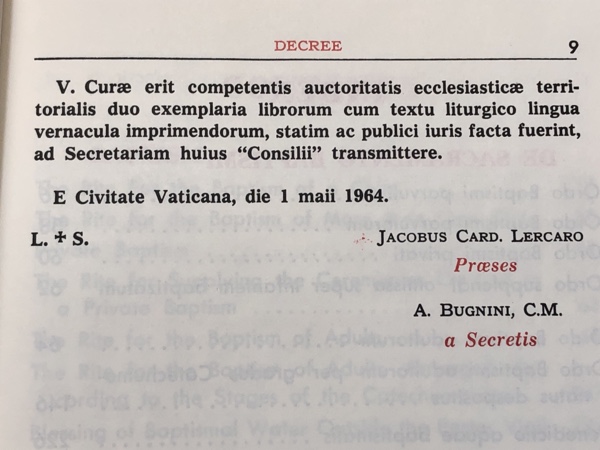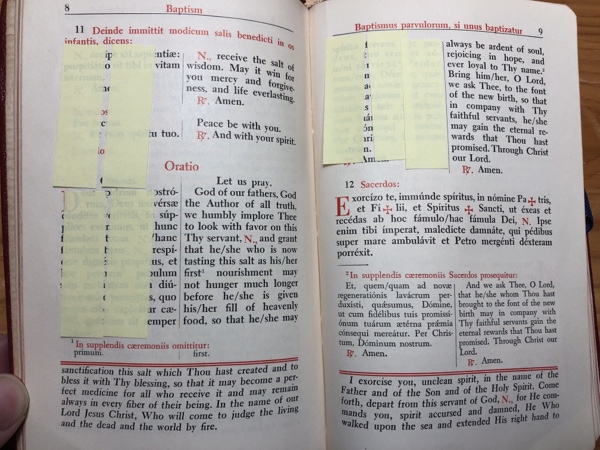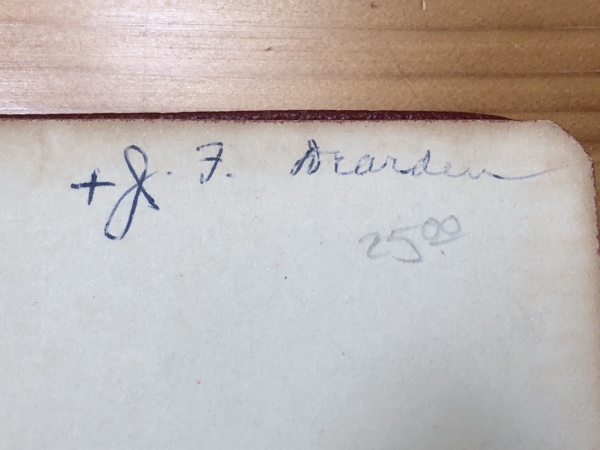 From a priest…
From a priest…
QUAERITUR:
When using the older ritual of blessings, the ones still used at the time of the Second Vatican Council, some of the blessing itself could be done in the vernacular. I have a Collectio Rituum that was printed in 1964 by Benzinger Brothers. It was approved for use by the National Conference of Bishops of the United States of America. Each page has two columns one with the texts in Latin and next to it text translated into English.
On page vi there is a translation of the Decree printed in Latin. It reads:
“In accordance with art. 36, par 4, of the Constitution of the Sacred Liturgy of the Second Vatican Council, we the Bishops of the United States of America, decree that the following English versions of the liturgical texts are approved for use in the celebration of the sacred liturgy in our dioceses, within the limits established in the decree of April 2, 1964 …”
Am I able to use this 1964 Ritual and recite the various blessings and exorcisms in English? Today, for example, I recited the blessing of the throats from the Collectio in Latin however, someone said that he would have appreciated it in English in order to understand what was spoken. This Collectio includes, as well, the Blessing of Holy Water translated into English. Is it permissible to recite it in English rather than Latin if advantageous for the people to grasp and participate interiorly.
The short answer is, “No.” I’ll explain, below.
There are two issues here, which intersect: participation and use the vernacular.
I contend that use of the vernacular does not automatically result in “interior” participation (which is a desired goal). Latin on the other hand can more effectively create an experience of mystery, lacking or diminished when the difficult signa of rites are reduced to a low common denominator. But that is not the main topic of the question.
To the question: Can the Collectio Rituum be used and, therefore, can some vernacular be used in rites, especially involving exorcisms?
The issue of the use of the 1964 Collectio comes up once in a while. The “emancipation proclamation” of Benedict XVI, Summorum Pontificum, established that the books in force in 1962 can be used. There was an 1961 edition of the Collectio in force in 1962. That is the Collectio to use. The differences are few, but important.
The 1961 Collectio accords with the 1954 and 1959 permissions which granted limited use of the vernacular. In 1959 the Sacred Congregation for Rites permitted, in these USA at least, vernacular for sacraments excepting exorcisms, sacramental forms and blessings, and some other moments, such as prayers after funerals.
The 1964 Collectio gives wider use. The 1964, however, also says – in memory serves – that forms of sacraments should be done in Latin.
 In my copy of the 1964 – I don’t have a 1961 – I’ve put post-it notes over the English translation columns in those moments when only Latin must be used (chiefly exorcisms) and over Latin when I can use English. Hence, I can use the 1964 book, but I use it in conformity with the 1961 edition.
In my copy of the 1964 – I don’t have a 1961 – I’ve put post-it notes over the English translation columns in those moments when only Latin must be used (chiefly exorcisms) and over Latin when I can use English. Hence, I can use the 1964 book, but I use it in conformity with the 1961 edition.
Any of the “Weller” books, helpful as they are, must also be adapted in this way, since they were issued – I believe – in 1965.
Hence, NO, the exorcisms and forms of sacraments, etc., are to be done in Latin. Most blessings I believe are to be done in Latin as well.
BTW… I have a red bound Collectio which originally belonged to “Iron John” Dearden, late Card. Archbp. of Detroit, and one of the ultimate liberals whose mess we are still stepping in even in our own days. He started, for example, Call To Action. I enjoy using his book when performing the traditional rites. It’s a mild form of Schadenfreude.



































On a related and coincidental note, I recently acquired a copy of the 1961 Excerpta e Rituali Romano issued for use in the dioceses of England and Wales, which I scanned and uploaded to https://archive.org/details/ExcerptaRitRomAngliaeCambriae/ just last week, where it can be freely downloaded. For clergy in England & Wales, this book thus gives the extent to which the vernacular may be used in the older Rituale as per Summorum Pontificum.
Though I imagine that the English translation differs between the 1961 British Excerpta and the 1961 American Collectio, I would have thought that the vernacular permissions would be broadly identical. It would certainly be interesting to compare the two books.
[Well done! Thanks!]
Can we please stop using the argument in traditionalist circles that Latin adds an “experience of mystery“? [Ummm…. no, we can’t.]
Keep in mind that up until the mid-1800’s, virtually all (men- and many women), except the very lowest classes, were proficient in Latin, and for the most part had an auricular understanding of it. [Who knows what “proficient” means, here. And that doesn’t change the fact that Latin wasn’t their primary tongue.]
The Latin of the Vulgate is easy/ basic… if someone studied the Gallic Wars as a 13 year old, chances are they understood the sung Gospel. [So what?]
For approximately 1500 years that Latin was the dominant liturgical language, it was understood by a sizable chunk of the faithful- for whom it was no “mystery” at all. [If you have been reading this blog for some time and don’t get the concept yet of mysterium tremendum et fascinans, then you have some remedial reading to do.]
One of the best books for this is the 1962 Parish Ritual compiled by Frederick McManus and published by Benzinger. It has the sacramental texts and approved translations in accordance with the 1961 Collectio.
It isn’t the easiest thing to find, but can be plucked off ebay with a little perseverance and a saved search.
As for Fr. Weller’s work, I think the problem there is slightly different. The copy of those that most people have, is, I think, this one, which is a reprint of an edition published circa 1950. The translations there are Fr. Weller’s, not the ones that were approved for liturgical use in the 1961 Collectio. Maybe in some instances they wind up being the same, but that would be by coincidence.
On the subject of Post-it notes in books:
To Post-it or Not to Post-it
https://siarchives.si.edu/blog/post-it-or-not-post-it
“Today, for example, I recited the blessing of the throats from the Collectio in Latin however, someone said that he would have appreciated it in English in order to understand what was spoken. ”
I too was lucky to receive the blessing in Latin from Father. I don’t know what he said but it didn’t matter to me, I was overjoyed to receive the blessing and it’s easy enough to google the short blessing for the English translation. Also, the devil hates Latin.
Gab — With crossed candles, your priest yesterday said: “Per intercessionem sancti Blasii, Episcopi et Martyris, liberet te Deus a malo gutturis, et a quolibet alio malo.” Then he made the sign of the cross over your head and said: “In nomine Patris, et Filii, + et Spiritus Sancti. Amen.”
It seems to me that the specific pastoral concern that triggered this question could be resolved by the priest telling his congregation, perhaps in his homily, what the text of the blessing he’s going to say means. It strikes me that this may also be a worthwhile exercise even if the priest is going to be saying the blessing in English.
There is a 3-volume edition of Weller, dated 1952, which also has better English translations than the one-volume English-only 1964 edition.
I recently remembered that I have a copy of the 1954 Collectio Rituum. For the first time in many years I was unable to attend the Feast of St. Blaise for the Blessing of the Throats at my FSSP parish. So I did the best I could and attended the local Novus Ordo parish where the deacon did the Blessing of the Throats but in English. I was wishing I had thought of it before the Mass, but I’m afraid neither the deacon or the priest are able to much more than “E Pluribus Unum” They have never been taught.